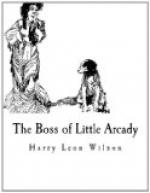The revisiting wanderer observed, as in a dream, an immaculate coupe with a couple of men on the box who behaved quite as if they were about to enter the park in the full glare of Fifty-ninth Street and Fifth Avenue, though they were but on a street of the little country among farm wagons. The outfit was ascertained to belong to a summer resident who was said, by common report, to “have wine right on the table at every meal.” No one born out of Little Arcady can appraise the revolutionary character of this circumstance at anything like its true value.
Further, in the line of vehicular sensationalism, a modish wicker-bodied phaeton and a minute pony-cart were seen on a pleasant afternoon to issue from a driveway far up a street that now has a name, but which used to be adequately identified by saying “up toward the Fair Grounds.”
The phaeton was occupied by two ladies, one rather old, to whom a couple of half-grown children in the pony-cart kissed their hands and shouted. They were not permitted to follow the phaeton, however, as they seemed to have wished. Its shock-headed pony, driven by an aged negro who scolded both children with a worn and practised garrulity, was turned in another direction. One of the children, a little dark-faced girl of eight or nine, called “Little Miss” by the driver, was repeatedly threatened in the fiercest tone by him because of her perilous twistings to look back at the phaeton. The cart was followed by a liver-and-white setter; a young dog, it seemed, from his frenzied caperings and his manner of appearing to think of something else in the midst of every important moment.
There proved to be two papers in the town, as of old, but the Argus was now published twice a week, Wednesdays and Saturdays. The wanderer eagerly scanned its columns for familiar names and for something of the town’s old tone; but with little success.
Said one item, “A string of electric lights, on a street leading up one of our hills, looks like a necklace of brilliants on the bosom of the night.” Old Little Arcady had not electric lights; nor the Argus this exuberance of simile.
Again: “This new game of golf that the summer folks play seems to have too much walking for a good game and just enough game to spoil a good walk.” Golf in the Little Country!
The advent of musical culture was signified by this: “At least thirty girls in this town can play the first part of ‘Narcissus’ pretty well. But when they come to the second part they mangle the keys for a minute and then say, ‘I don’t care much for that second part—do you?’ Why don’t some of them learn it and give us a chance to judge?”
The Argus had acquired a “Woman’s Department,” conducted by Mrs. Aurelia Potts Denney, wife of the editor,—a public-spirited woman, prominent in club circles, and said to be of great assistance to her husband in his editorial duties. The town was proud of her, and sent her as delegate to the Federation of Woman’s Clubs; her name, indeed, has been printed in full more than once, even by Chicago newspapers. Some say that wisely she might give more attention to her twin sons, Hayes and Wheeler Denney; but this likely is ill-natured carping, for Hayes and Wheeler seem not more lawless than other twins of eight. And carpers, to a certainty, do exist in Little Arcady.




